 Petzlover
PetzloverMuggin is originated from United States but Talbot is originated from France. Muggin may grow 55 cm / 21 inches shorter than Talbot. Muggin may weigh 28 kg / 61 pounds lesser than Talbot. Muggin may live 3 years more than Talbot. Both Muggin and Talbot has almost same litter size. Muggin requires High Maintenance. But Talbot requires Low Maintenance
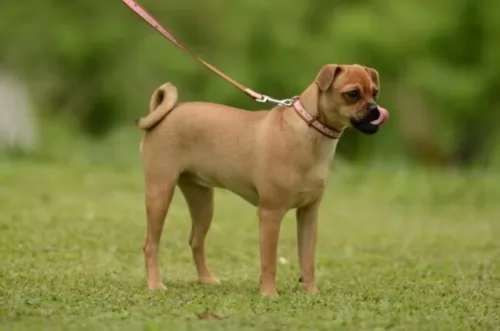 The Muggin is not a purebred dog but rather a cross breed. The hybrid dog population has exploding in the United States in the past ten to fifteen years. A lot of the success of crossbreeding can be attributed to the marketing of these dogs as “Designer Breeds”.
The Muggin is not a purebred dog but rather a cross breed. The hybrid dog population has exploding in the United States in the past ten to fifteen years. A lot of the success of crossbreeding can be attributed to the marketing of these dogs as “Designer Breeds”.
Designer breeds are developed because someone wants some of the characteristics of Breed X and some of the characteristics of Breed Y. Therefore, Designer breed XY is developed. In order to understand this hybrid dog, you need to understand the two purebred breeds they come from. The Muggin is the result of crossing the purebred Pug and the purebred Miniature Pinscher or Min Pin. So, we need to look at the origins of these two purebred breeds.
They are also referred to as Pin Pugs, Min Pin Pug, Pug Pin, Pugscher and were originally the Carlin Pinscher. However, these days there are other breeds besides the Pug and Min Pin making up the gene pool for the Carlin Pinscher. Because of this the Muggin has been separated from the Carlin Pinscher. The American Canine Hybrid Club has accepted the Muggin name for the Pug Min Pin cross.
Pugs are originally a Chinese breed and they were companions rather than working dogs of any kind. During the Han Dynasty they were the dogs of royalty. At the same time there were dogs very much like the pug in Japan and Tibet. The Pugs came to Europe by way of trades with the Dutch who then brought them to Europe. They were named the Mopshond and they caught the eye of the royalty in Europe as well.
Pugs were imported to the United States after the U.S. Civil War and in 1885 they were recognized by the American Kennel Club and called Pugs.
The Min Pin traces its origins to Germany a few hundred years ago. They were “ratters”, guarding the house and stables from all types of vermin. Most dog people believe that the Min Pin is much older than this, perhaps by thousands of years. Yet there is no detailed history to support that. Most believe the breed comes from the German Pinscher line. There might also be some Daschund and Greyhound in that line.
They were once called the Reh Pinscher. This was their name when they came to North America in 1919 and then the breed was renamed in 1972. The Miniature Pinscher Club of America was started in the early 1900’s while the AKC recognized the Min Pin in 1929. Today the Miniature Pinscher is a family dog, a companion.
The Muggin is a loving and loyal dog. All they want is for you to be happy and to share that happiness with them. They can also easily become a one person dog and bond intensely with that one person. They are not a hybrid that you can leave home alone while you go to work for 8 to 10 hours a day. No, the Muggin needs attention and lots of it. Despite this they are great with both kids and other dogs.
Because they are a cross breed, they are not recognized by the American Kennel Club. However, some hybrid registries do recognize the Muggin. These include the Designer Breed Registry, the International Designer Canine Registry, The Designer Dogs Kennel Club, the American Canine Hybrid Club, and the Dog Registry of America.
Known as the Talbot Hound, nobody really seems to have accurate records as to the origins of the Talbot dog breed but it seems to have originated in France.
It is believed that the Talbot, with his excellent nose, was a hunting dog, but he is now extinct.
It is thought that the dog descends from the beagle and the bloodhound. It came to England in 1066 and vanished towards the end of the 18th century.
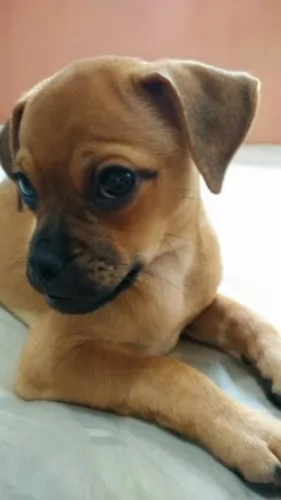 As previously mentioned, the Muggin is a cross between the Pug and the Miniature Pinscher. They are small, shave sturdy legs, floppy ears, and a wrinkled forehead for the most part. Like all hybrids however, all first generation dogs do not look the same. Some might resemble the Min Pin more and others the Pug. Some might have the stockier body of the Pug and the short tail of the Min Pin. Or one could have the Pug’s curly tail and the athletic body of the Min Pin. The snout can be short or long, the ears heavy and floppy or small and thin.
As previously mentioned, the Muggin is a cross between the Pug and the Miniature Pinscher. They are small, shave sturdy legs, floppy ears, and a wrinkled forehead for the most part. Like all hybrids however, all first generation dogs do not look the same. Some might resemble the Min Pin more and others the Pug. Some might have the stockier body of the Pug and the short tail of the Min Pin. Or one could have the Pug’s curly tail and the athletic body of the Min Pin. The snout can be short or long, the ears heavy and floppy or small and thin.
Their coats will usually be fine and short, and colors can vary a lot. They might be black and tan like a Min Pin, or more like a Pug with a solid color of cream, brown, black, white or golden. They also tend to shed quite a bit no matter which parent they take after the most. They will either have brown noses and black eyes or brown eyes and black noses or any combination of black and brown.
If Muggins are only bred to Muggins the second and third generations will resemble each other more than the first generations will. However, at this point many breeders will try to strengthen the breed by occasionally adding in to the gene pool other dog breeds.
The Talbot hound was a large, white purebred dog. He stood at roughly 58 to 69cm and weighed between 36 and 50kg.
He had a large head and a short, smooth, coarse pure white coat. He has a long tail which he held upright and fairly long floppy ears. He was a slow but efficient scenthound.
It is believed that this strong, hard working dog was gentle, loving and loyal and that he would have made an excellent family pet.
They were the kind of dogs that needed lots of social interaction with his human family. His amicable nature would have meant him getting on well with children and other dogs.
Slow, it’s a dog that had low intelligence and he may have taken a long time to learn any simple tricks or commands. If he were around today he wouldn’t have been suited to city living as he was a vocal breed – having quite a selection of barks and howls to voice his opinion.
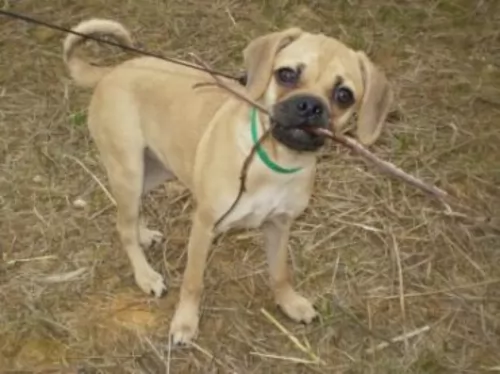 They are good with children but should be supervised.
They are good with children but should be supervised.
Energetic and loving little dogs.
Very adaptable if taken for walks or has space in a yard. Can live anywhere under those circumstances.
Very intelligent but strong willed dog. Needs strong leadership from their person.
The Talbot is extinct, but he was no doubt a docile, calm kind of dog that would have made a great family pet.
He would have been an ideal dog for first time dog owners too as he was a gentle, affectionate dog.They were tough, protective, stubborn but loving and loyal, and more’s the pity that this dog has disappeared.
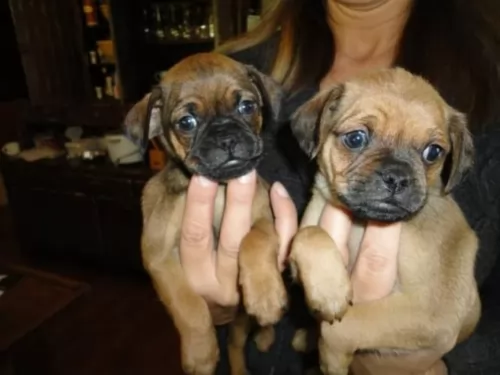 The first generation of Muggins may face all the health issues of either or both their parents, while second and third generations tend to have less health issues, They types of issues the first generation of Muggins might face include:
The first generation of Muggins may face all the health issues of either or both their parents, while second and third generations tend to have less health issues, They types of issues the first generation of Muggins might face include:
Nerve Degeneration – Degenerative Myelopathy or Dm – causes paralysis and eventually fatal.
Nobody can say what the health status of the Talbot dog was, but being a hunting dog, out in the open and getting plenty of exercise, he was no doubt a healthy dog. But all dogs can fall ill at some time or another with any one of the many dog illnesses there are -
Ear infections in dogs are quite common, but more so with dogs that have floppy ears.
You’ll see your pet scratching and pawing at his ears and shaking his head. There will in all likelihood be redness in your pets ears and you may even detect an abnormal odor.
There are quite a few things that can cause these ear infections in dogs such as ear mites, an excess of dirt and wax and bacteria.
Don’t allow your pet to suffer – get him to the vet. Your veterinarian will also show you how you can clean the ear for future times with a gentle cleanser. You have to be so careful not to rupture the ear drum, and some people prefer to get their vet to do this or professional groomers.
The Talbot could have suffered with ectropion – when the lower lids are turned out. Ectropion disrupts the function of the lower lid so that it can't protect the eye, and there is abrasion of the surface of the eye.
This condition can also bring on conjunctivitis. Get your pet to the vet for treatment and relief.
The lifespan of the Talbot was anything from 9 to 12 years of age, and one or two other health problems that could have shortened his life were dermatitis, cancer, hip dysplasia and eye infections.
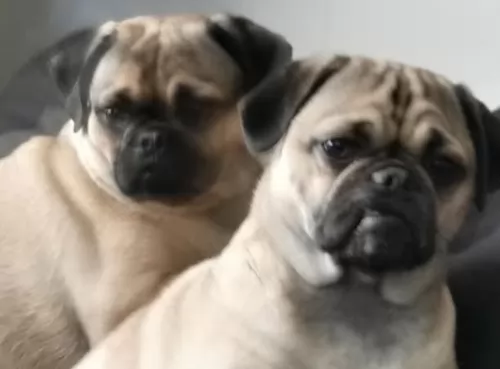 This crossbreed has a definite propensity to overeat and become obese from puppyhood. Feed the puppy a small dog dry food 3-4 times a day a total of ¾ of a cup to 1 cup.
This crossbreed has a definite propensity to overeat and become obese from puppyhood. Feed the puppy a small dog dry food 3-4 times a day a total of ¾ of a cup to 1 cup.
Again don’t over feed the adult Muggin or he will become obese easily. Feed at least twice a day one to one and half cups total.
High Energy
With the athleticism of the Min Pin taking precedence over the less active Pug, the Muggin is a fairly active dog. The Muggin is also not effective by the Pug’s difficulty with heat and cold. They love to go on long walks and need exercise to keep from being bored and destructive. However, remember there is a Pug in your Muggin and if she is not into exercise don’t try to get her to do more than she can.
You do want your Muggin to get enough exercise to fend off any tendency to be overweight. They are good at agility, jogging, obedience and watchdog activities.
The Talbot with his short hair would have been looked upon as a low maintenance breed and would have required a brush now and again.
Because of the floppy ears, they would have needed to be checked inside for infection.
The Talbot was a strong, hard-working kind of dog so if commercially manufactured dog food was available in that time, you would have ensured a good quality one for strong, energetic dogs.
At that time, Talbot dog owners tossed their dogs bits of raw meat. Home-made food like boiled chicken, brown rice, spinach, carrots and sweet potatoes without any exotic flavorings would have been an excellent diet.